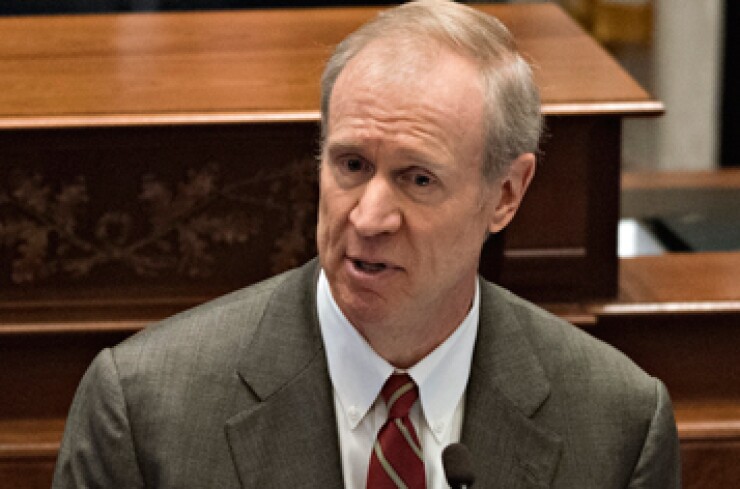CHICAGO – Illinois Gov. Bruce Rauner used his amendatory veto powers as threatened to cut a chunk of new funding earmarked for Chicago Public Schools in legislation overhauling school funding formulas.

“With my changes, our state ensures that enough resources flow to children in the poorest and most disadvantaged school districts across the entire state,” Rauner said during a news conference Tuedsay, announcing his amendatory veto of Senate Bill 1. “And my changes ensure that the education funding system in our state is fair and equitable to all students in Illinois.”
The action wasn't a surprise, as Rauner had been pounding Democrats to send him the bill that passed two months ago. Senate President John Cullerton, D-Chicago, said last week he was waiting until Monday to allow time for negotiations on a compromise. The bill landed on Rauner's desk Monday and he acted Tuesday.
The veto puts the ball back in the state Senate’s court with aid payments to the state’s more than 800 districts hanging in the balance. The state can’t begin distributing monthly payments next week unless an evidence-based distribution model such as the one laid out in SB1 is adopted.
The poison pill was inserted in the state budget package pushed through by Democrats last month with some support from GOP members who broke with Rauner.
Lawmakers could concur with the rewrite of the bill or attempt an override. Democrats aren't willing to accept Rauner’s changes. Both actions require a three-fifths majority vote. A successful override in the House is uncertain.
Without action, the bill would die and school aid distribution would remain in limbo. A 15-day clock on action begins ticking Tuesday as the Senate was expected to read the AV into the record. While Rauner is pushing lawmakers to concur, CPS and others have suggested that he might have overstepped his constitutional authority in the bill’s makeover.
CPS is banking on nearly $300 million -- $70 million in new general state aid and $220 million in pension funding help -- in SB1 to help whittle down a $544 million deficit in its fiscal 2018 budget, which will be unveiled next week.
Rauner portrayed CPS as a winner, saying it would receive about $200 million in new funding. Details on the fiscal impact of the veto on CPS and additional action that might be needed to get CPS its funding remained cloudy.
That’s because Rauner’s AV cuts $250 million in block grants CPS now receives while providing higher aid levels and new pension funding support that other districts currently receive. The catch is the pension help is stripped out of SB1 – as it was in a previous Republican version of the bill -- and would need to be approved in separate budget legislation.
Democrats defend the additional CPS pension funding as fair because it brings CPS in line with other districts that will benefit from $4.6 billion in state pension help in fiscal 2018.
The administration has asked the Illinois State Board of Education to run the impact of the AV on funding levels across all districts. “Until ISBE runs the numbers, we don't have exact figures,” spokeswoman Laurel Patrick said.
Democrats who hold a majority in the General Assembly were also still assessing the impact and their next step while also attacking Rauner’s action.
Mayor Rahm Emanuel attacked Rauner’s characterization of the CPS pension help as a bailout that shouldn’t be in the funding overhaul. “His math is fuzzy, his claims have been proven false and the only thing the governor's action advances is his own personal brand of cynical politics.”
While no districts have notified the state of a delay in the opening of schools later this month or in September, some have warned they will need to borrow or dig deeply into reserves to open and may not be able to remain open for long if their aid payments are delayed.
Fitch Ratings is watching the situation, analysts said in a report late last week on the new state budget’s impact on local government credits.
Separating the pension aid out into separate budget legislation would pose a disadvantage to Chicago schools “as it would make the aid vulnerable to budget appropriation each year,” Fitch wrote. “Either version represents a large increase in funding for the CBOE, whose financial position is characterized by chronic structural imbalance, slim reserves and a weak liquidity position.”
On the distribution of aid across the state, Fitch said it would begin reviewing credits, as payments would be delayed if legislation is not approved by Aug. 3. Fitch said it would “closely monitor the potential impact this may have on Illinois school district ratings and if no legislation is passed by that date, will take action on a case by case basis as necessary.”
Senate GOP minority leaders said they support the AV but are open to a compromise. “Our caucuses stand with the governor's recommendations and will oppose efforts to override his veto,” a statement read. “However, we remain open to compromise developed through real, productive negotiations designed to reach consensus.”
Rauner’s rewrite maintains a per-district hold harmless provision until the 2020-2021 school year, and then moves to a per-pupil hold harmless based on a three-year rolling average of enrollment.
SB1 provides an overall increase in funding of $715 million bringing aid levels to about $6.7 billion. That includes $221 million for CPS pensions and an increase of $350 million in new funding to be distributed to districts through the new formula. It also includes an increase of $50 million for early childhood education.





